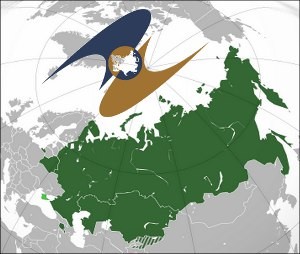BISHKEK (TCA) — According to the Centre for Integration Studies of Eurasian Development Bank (EDB) and the International Institute for Applied Systems Analysis (IIASA, Austria), it is essential to step up efforts to normalise and develop relations between the European Union (EU) and the Eurasian Economic Union (EEU) with the aim to reach a comprehensive integration agreement in the long run. This conclusion was presented in their report “European Union and Eurasian Economic Union: Long-Term Dialogue and Perspectives of Agreement” based on the results of the joint project “Challenges and Opportunities of Economic Integration within a wider European and Eurasian Space”, the EDB press office reported.
The conceptual framework of the common economic space “from Lisbon to Vladivostok” has two planning horizons — a short-term and a long-term one, the report says. In the short run, it is essential to take stock of EU-Russia relations. However, to launch an official dialogue between the two unions, it is equally important to get the EU recognise the Eurasian Economic Union and the Eurasian Economic Commission.
Addressing basic political issues is vital to bring the current conflict to an end. Such efforts, though, should be reinforced with conceptual analysis of developing EU-EEU economic relations and search of practical approaches to achieving that goal.
The underlying assumption of the report is that in future, EU-Russia relations will be channelled into constructive frameworks with prospects for lifting mutual sanctions. EU-EEU relations should be based on long-term visions and planning. According to experts of the EDB Centre for Integration Studies, an integration agreement between the two unions will become feasible by the mid-2020s.
“To that end, steps are to be taken now to define the forward-looking agenda at the expert level and build an analytical foundation for future negotiations,” says Evgeny Vinokurov, Director of the EDB Centre for Integration Studies. “We have identified 20 promising areas for the negotiation process.”
The anticipated EU-EEU cooperation agreement should be comprehensive and take into account a wide range of issues to be covered, the magnitude and structure of relations, and the degree of connectivity between the two unions. Such an agreement can cover many areas of cooperation ranging from trade in goods and services to free capital flows, from the visa-free regime to transborder and transit infrastructure development, from technical regulations to intellectual property right protection.
The report was prepared based on the results of the first stage of the international project “Challenges and Opportunities of Economic Integration within a Wider European and Eurasian Space”. As of today, this project is a unique independent platform for a regular dialogue between the European Commission and the Eurasian Economic Commission. The second stage of the project is to be launched in 2017. It will be focused on a wide array of studies aimed at bringing the EU and EEU positions closer, while taking into account relations with China and other major Asian partners.








